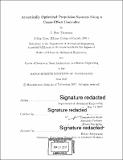Acoustically optimized propulsion systems using a Cause-Effect Controller
Author(s)
Thomson, J. Ben (Jules Ben)
DownloadFull printable version (40.10Mb)
Other Contributors
Massachusetts Institute of Technology. Department of Mechanical Engineering.
Advisor
Themistoklis Sapsis.
Terms of use
Metadata
Show full item recordAbstract
The proposed Acoustic Response Control Process (ARCP) allows for a "Cause- Effect" Controller (CEC) to provide a method to optimize the trade-off between a marine vessel's ability to maneuver and the radiated acoustic noise (or internal vibrations). Through the discretization of both a marine vessel's motion and all possible configurations for the vessel's propulsion and control systems, a finite number of unique states can be created. The ARCP uses hardware and software together with a CEC to learn the cause-and-effect relationship between the finite states of the ship and the resulting acoustic noise and vibrations which are generated. Once this relationship is determined, the same CEC can use these relationships in reverse order to predict the amount of acoustic noise that would be generated by a proposed propulsion change or maneuver. In this context, any maneuver or speed change is simply considered a state change. The CEC could then choose the optimal new end state, along with intermediate states which provides the greatest speed, acceleration, and ability to maneuver without exceeding the user-defined acoustic thresholds. The ARCP offers a number of both civilian and military applications. The ARCP, for instance, can be used on merchant ships to avoid certain frequency and amplitude combinations which interfere with marine life. Vehicles that use acoustic sensors could optimize their search speeds while minimizing their own noise which interferes with their sensors. For military applications, the ARCP will give vessels the greatest ability to maneuver while maintaining stealth from hostile acoustic sensors.
Description
Thesis: S.M., Massachusetts Institute of Technology, Department of Mechanical Engineering, 2017. Thesis: S.M. in Naval Architecture and Marine Engineering, Massachusetts Institute of Technology, Department of Mechanical Engineering, 2017. Cataloged from PDF version of thesis. Includes bibliographical references (pages 239-240).
Date issued
2017Department
Massachusetts Institute of Technology. Department of Mechanical EngineeringPublisher
Massachusetts Institute of Technology
Keywords
Mechanical Engineering.